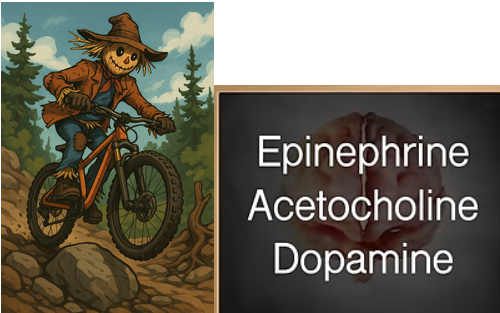Why Looking Foolish Makes You Smarter
Mountain biking does something sneaky to your brain. You think you’re just out there dodging rocks, praying your front wheel doesn’t betray you, and yelling at tree roots like they personally wronged you. But behind the scenes your nervous system is basically throwing a surprise graduation party for itself.
According to neuroscientists, especially Dr. Andrew Huberman, trail riding hits the exact ingredients your brain needs to rewire: novelty, unpredictability, gravity pulling you in weird directions, the possibility of failure, and the gritty determination to keep going anyway. That mix lights up the neurochemical cocktail that says: time to grow.
The video “What this does to your brain” starts by pitching a somewhat surprising claim: riding mountain bikes (MTB) does more than just wear out your tires — it actually stimulates your brain in ways that many conventional exercises don’t. According to the host, and citing Huberman, this kind of activity can trigger neuroplasticity — meaning your brain can form new neural connections, even in middle age.
The explanation goes like this: When you ride trails (not smooth road cycling), you’re dealing with unpredictable terrain — changes in elevation, shifts in gravity, side-to-side and front-to-back motion (pitch, yaw, roll). The brain uses special inner-ear sensors (the semicircular canals) to monitor orientation relative to gravity, and when you repeatedly put yourself in novel, challenging movement situations, you activate mechanisms of learning and adaptation.
The video identifies three key neuro-chemicals involved in opening the “plasticity window”: epinephrine (alertness), acetylcholine (focus), and dopamine (motivation). These chemicals are triggered when you do something your brain identifies as novel or “error-prone” — that is, you can’t immediately do it, you mess up, you fail, you try again. That error/frustration is not a bug — it’s the signal your nervous system needs to rewire.
It’s almost as if the Scarecrow from The Wizard of Oz were a mountain biker.
Remember him? Convinced he had no brain, stumbling through adversity, picking straw out of his ears while worrying he’d never be smart. Yet every time he took a risk, solved a problem, or faced something terrifying (flying monkeys, which, let’s be honest, are basically mountain-bike-trail gremlins with wings), he was accidentally building neural circuitry. By the time he reached Oz, the “brain” he thought he lacked had already been forged by the journey. The diploma was just confirmation of what the struggle had already created.
Mountain biking does that to you. The moment you pick a feature you avoid, mess it up, try again, and feel that mix of frustration and focus, your brain opens a little plasticity window. You’re laying down new wiring. Not theoretical wiring. Real physical changes. It’s the same mechanism kids use to learn language. It’s how adults keep their mental sharpness from going stale.
“The way to increase plasticity is to send signals to the brain that something is wrong”
Every wobble, every failed corner, every “I swear this trail is plotting against me” moment is basically your inner Scarecrow growing smarter.
The trick is sessioning: 15–30 minutes focused on one problem. Not endless loops where you fail randomly, but deliberate attempts, followed by real rest. Sleep is where the rewiring locks in. The next day you ride the same feature, and suddenly it feels easier. Not because the dirt changed. Because you did.
And just like our hay-stuffed friend walking that yellow brick road, you don’t notice when the learning happens. You only notice after, when you realize you’re doing something that used to terrify you.
The Six Ingredients for Real Learning
Strong basics: Good food, steady exercise.
Century Ride: Get out and move.
Novelty: Do what you haven’t mastered.
Gravity: Tilt, twist, wobble.
Real stakes: Care enough to improve.
Fail forward: Mistakes drive rewiring.
Sleep: That’s when the upgrades stick.
That’s the magic: intelligence created by motion, fear, curiosity, mistakes, and gravity tugging you in every direction but straight.
Turns out nobody needs a wizard. Whether it's surfing, mountain biking, wing foiling, or even knitting, all it really takes is a challenge, a bit of courage, and a willingness to look a little foolish while you learn.


